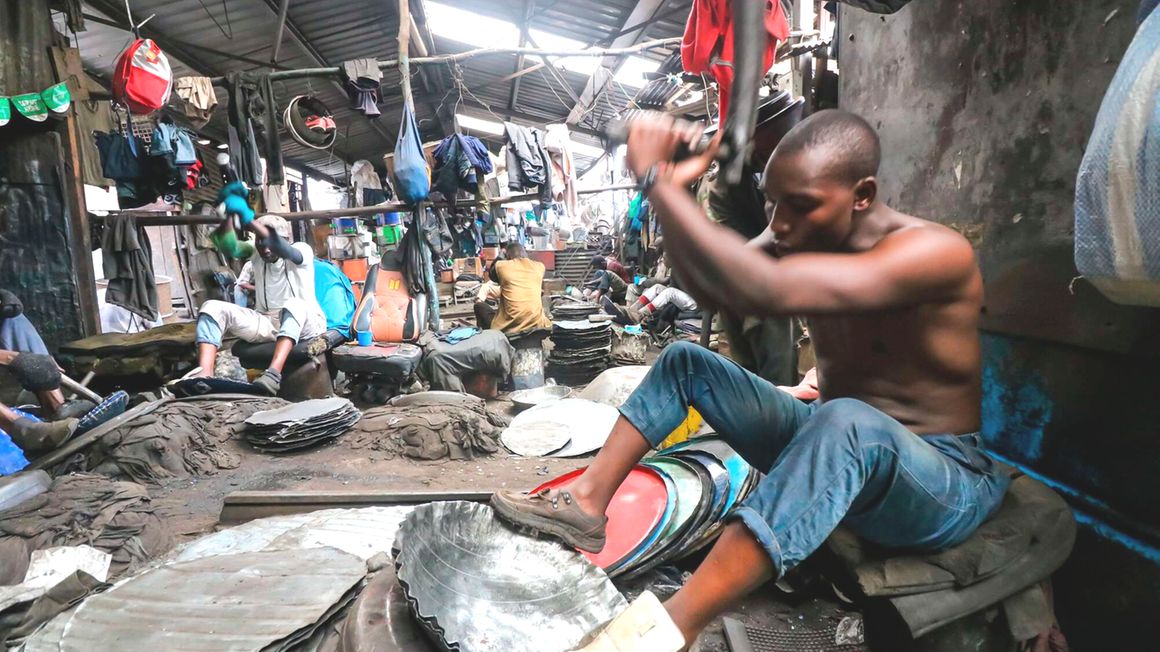
Tinsmiths at Kamukunji Jua Kali centre in Nairobi on March 22, 2023. PHOTO | WILFRED NYANGARESI | NMG
The number of Kenyans starting and running formal ventures last year rose at the
slowest pace in more than a decade excluding the pandemic year, signalling in part the impact of rising inflation and piling cost of operation.The official jobs report shows self-employed and unpaid family workers grew at an estimated 2.69 percent in 2022, the most sluggish since 2009 when the country was coming out of the deadliest post-election violence and smarting from the worst global financial crisis.
Kenya added an estimated 4,400 workers running own businesses and those working for family ventures in the formal sector without salaries, according to the Economic Survey 2013.
The findings by the Kenya National Bureau of Statistics, covering the period through June 2022, estimates Kenyans running own ‘hustles’ and family members supporting them pro-bono at 168,100, modestly grown from 163,700 in the prior year.
This is the slowest growth since 0.15 percent expansion to 67,500 workers in 2009.
Kenya endured the worst drought in four decades, the biggest jump in prices of basic commodities in five years and a sustained slide in the value of the shilling against major international currencies in a net import economy.
Business lobbies, including the Federation of Kenya Employers and Kenya Association of Manufacturers, have over the years complained of increasing cost of operation, with “multitude” of taxes and levies tripwires pushing smaller firms into informal, or jua kali, sector.
“Many businesses especially the MSMEs [micro-, small- and medium-sized enterprises] cannot afford the costs associated with operating in the formal employment sector,” FKE executive director Jacqueline Mugo told the Business Daily on April 4.
“This has led to the growth in the number of unemployed Kenyans as many employers try to manage their costs.”
Small ventures have in the past year born the biggest brunt of the stubbornly rising price pressures on the back of high cost of materials and energy as well as a weakening shilling amid short supply of dollars.
Inflationary pressures eroded consumers’ purchasing power, reduced demand for goods and services, and constrained new investments.
Read: New jobs hit six-year high with 926100 positions
The challenges for the MSMEs have over the years been compounded by limited access to formal credit, prompting a considerable number to close in early stages of operation.
Some are forced to shift from formal to informal outfits to survive.
A 2016 survey by KNBS, for example, suggested overwhelming majority of small businesses are unregulated, with 65 percent operating without licences and 92 percent not approved by registrar of companies.
Deepening labour market crisis has extended to the informal sector which last year added the smallest number of jobs in seven years, excluding the pandemic year in 2020 when businesses were forced to shut.
The Economic Survey data estimates new jobs in the Jua Kali sector for the year ended June 2022 at 702,900 workers — the lowest since estimated 185,800 workers in 2015.
The slowdown in the number of jobs created in the informal sector may worry policymakers because businesses not formally registered have for many years been the driver of employment opportunities, accounting for more than 80 percent of the labour market.
Employment in Jua Kali in the review period crossed 15.96 million mark, representing about 83.37 percent of the country’s nearly 19.15 million labour market.
The wage employment in the modern sector for government and private firms, on the other hand, accounted for 3.015 million, or about 18.89 percent, of the market.
“We urge the government to work with the employers to reduce the tax wedge on labour. The current high labour costs are unsustainable and stifle job creation,” Ms Mugo said.
President William Ruto, who rode to power last September largely on a successful campaign to lift the living standards of millions of “hustlers”, has launched a financial inclusion fund offering unsecured loans at eight percent interest payable to support micro-sized businesses.
“The Hustler Fund is an instrument to correct market failures at the bottom of the pyramid,” Treasury secretary Njuguna Ndung’u said earlier.
Read: 67pc of Kenya's jobless give up on work search
“Most of the time we start financial products to address needs at the bottom of the pyramid, but what happens is that the product leaves and moves on to the next level… whereas the intention should be that people are the ones to move upwards not the product.”
→ cmunda@ke.nationmedia.com




No comments :
Post a Comment